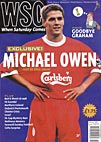 Steve Greenfield and Guy Osborn discuss the latest findings from the government to tackle hooliganism
Steve Greenfield and Guy Osborn discuss the latest findings from the government to tackle hooliganism
The recently announced Home Office Review of Football-Related Legislation makes 29 recommendations for changes in the law, including a new raft of specific measures to deal with hooligans. Although the government has invited comments, it seems the measures may come into force earlier than anticipated, since the Conservative MP Simon Burns has published a private member’s Bill that contains many of the recommendations and this may be pushed quickly through parliament with government support.
The National Criminal Intelligence Service, welcoming the Review, noted that the downward trend in football-related disorder was showing signs of slippage – the number of reported incidents rose in the early part of this season. Whether the review proves to be anachronistic or prophetic depends on the answer to two questions. Is the reported rise in hooliganism significant? If so, is further legislation an effective way to tackle it?
Over the past decade a stream of legislation has sought to deal with the perceived problem of football hooliganism. This has embraced not only general public order legislation, but also specific legislation that has sought to regulate different parts of the problem, such as alcohol consumption, racist chanting and ticket touting.
Since 1992-93, NCIS figures show that while attendances have steadily increased, arrests at football grounds have decreased. Such legislation, in conjunction with the move towards all-seater stadia and the increase in surveillance tools such as CCTV, has certainly contributed to the creation of a safer environment for watching football. Indeed, the Review admits disorder has largely been displaced to areas away from grounds.
This in itself makes it more difficult to produce new laws that are both effective against violence and fair to law-abiding fans and the broader community. Some of the recommendations are broadly unproblematic. For example, it has long been recognised that the provisions regarding racist chanting were flawed in that chanting had to be done “in concert with others” in order for an offence to be committed. The Review propososes to extend this to include an individual making racist comments, although whether this will lead to more convictions remains to be seen, especially while stewards rather than police remain the front line of enforcement.
Other changes are potentially more far-reaching. For example, while the consumption of alcohol is already limited, the new proposals would allow chief police officers to apply for alcohol sales to be banned from specific areas for up to 24 hours, affecting fans and other members of the public alike.
Perhaps most problematic is the proposed extension of the courts’ powers to issue the new banning orders without the need for a conviction. The aim is to deal with Category C hooligans who are seen as instigators rather than perpetrators of violence and against whom it is hard to obtain convictions for a football-related offence. It would involve the police offering intelligence information that the individual was involved with hooliganism. Apart from obvious civil liberties considerations of acting without a conviction, such a law would be extremely difficult to devise –indeed the Home Office acknowledge it might be considered “disproportionate to the mischief”.
The proposals share a general problem with much football-related legislation, in that they tend to produce unintended consequences. For example, the legislation on alcohol sales sought to sever the link between hooliganism and drinking, but the banning of alcohol from grounds may only lead supporters to drink locally and arrive at the ground later, with consequent safety problems. The new recommendations would permit a ban on the sale of alcohol throughout a wider area – a move likely to disperse those fans wanting a drink, in turn making it more difficult to police them.
Similarly conflicting ideas can be seen in the policy behind the Review. Raising concerns about the growing “menace” of hooliganism implies that it still exists as a problem within English football, which may make the 2006 World Cup bid less attractive. The alternative is to assume the problem has been largely resolved and not enact any new legislation, though this might be internationally unconvincing after events at France 98.
Acknowledging that the problem is still present, then, leads to a disproportionate reaction as the government seeks to demonstrate its strong law and order credentials for an international audience. The legislative response is far more draconian than the “problem” merits. Examples given by the NCIS of hooligan incidents this season nearly all concern events away from grounds and it is hard to see how any would have been prevented by the new recommendations, without widespread use of the most controversial element, the non-convicted banning orders.
Adding to the welter of football legislation does not seem likely to resolve the government’s difficulties with hooliganism, or help to improve the experience of going to a football ground. The problem is essentially with the application of the law rather than a lack of it
From WSC 144 February 1999. What was happening this month